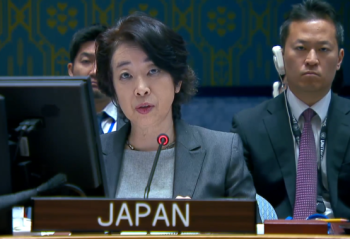Statement by H.E. Ambassador SHINO Mitsuko, Deputy Permanent Representative of Japan to the United Nations, at the United Nations Security Council Briefing on Syria’s Political & Humanitarian Situation
2024/6/25

(as delivered)
Thank you, Mr. President.
I thank Deputy Special Envoy Rochdi and OCHA Director Rajasingham for their valuable briefings.
Mr. President,
The Syrian crisis, now in its 14th year, has left more than 90% of the population living below the poverty line. Both the humanitarian and economic situations are at their worst. The number of refugees and displaced persons from this conflict is the largest since World War II.
The issue of detainees and missing persons remains of grave concern. We cannot allow for a "lost generation" of Syrians to be this conflict’s legacy. On this basis, I would like to make three points today.
First, a political transition in line with Security Council Resolution 2254 is the only way to achieve a lasting solution. The Constitutional Committee was supposed to serve as the entry point for resolving the Syrian crisis and drafting a new constitution.
Yet it has remained suspended for more than two years. The Syrian government and opposition should agree as soon as possible on a path toward an early resumption rather than remaining stuck on disputes over the venue.
Japan also values confidence-building measures through the Arab Initiative. Concrete engagement by the Syrian government based on the Amman and Cairo Communiques by the Arab Contact Group is needed, and we strongly encourage the early holding of the next meeting.
Secondly, the UN now faces its most significant funding gap since the beginning of the conflict, which has already led to a reduction in its activities and those of other humanitarian agencies.
Even with no political resolution in sight, early recovery and resilience assistance could have a long-term and sustainable impact on the health, education and livelihoods of ordinary Syrians, and thus contribute to reducing the risk of instability in Syria and beyond. Recently Japan decided to provide approximately 6.5 million USD for additional early recovery assistance through UN-Habitat.
In this vein, we commend the UN for launching the Early Recovery Strategy and the Early Recovery Trust Fund concept. This issue should be addressed not only by traditional donors, including Japan, but also by the international community as a whole.
At the same time, in addition to early recovery, it is essential to continue cross-border assistance as long as humanitarian needs exist, and we hope that the consent of the Syrian government for the use of Bab Al-hawa will be extended beyond July 13 as well.
Thirdly, Japan has and will continue to provide assistance not only to Syria but also to neighboring refugee host countries. As High Commissioner Grandi stressed in Brussels, we should not underestimate the scale and severity of the hardships faced by host countries and it is our responsibility to redouble our support for them.
At the same time, the current situation in Syria is not conducive to a safe, voluntary, and dignified return of refugees. We believe that economic, security and legal obstacles stand in the way.
The international community must do more to promote early recovery projects and resilience support, and the Syrian government must address security concerns, including protection for refugees.
Lastly, achieving a solution in Syria requires pragmatism from all parties. While stressing the need for de-escalation throughout Syria and the region, we urge serious commitments by all major stakeholders in step-for-step confidence-building measures led by the Special Envoy.
As a responsible Council member, Japan will engage with all relevant countries, including the Syrian government, to achieve a political solution that can realize the Syrian people's desire for peace.
I thank you, Mr. President.
